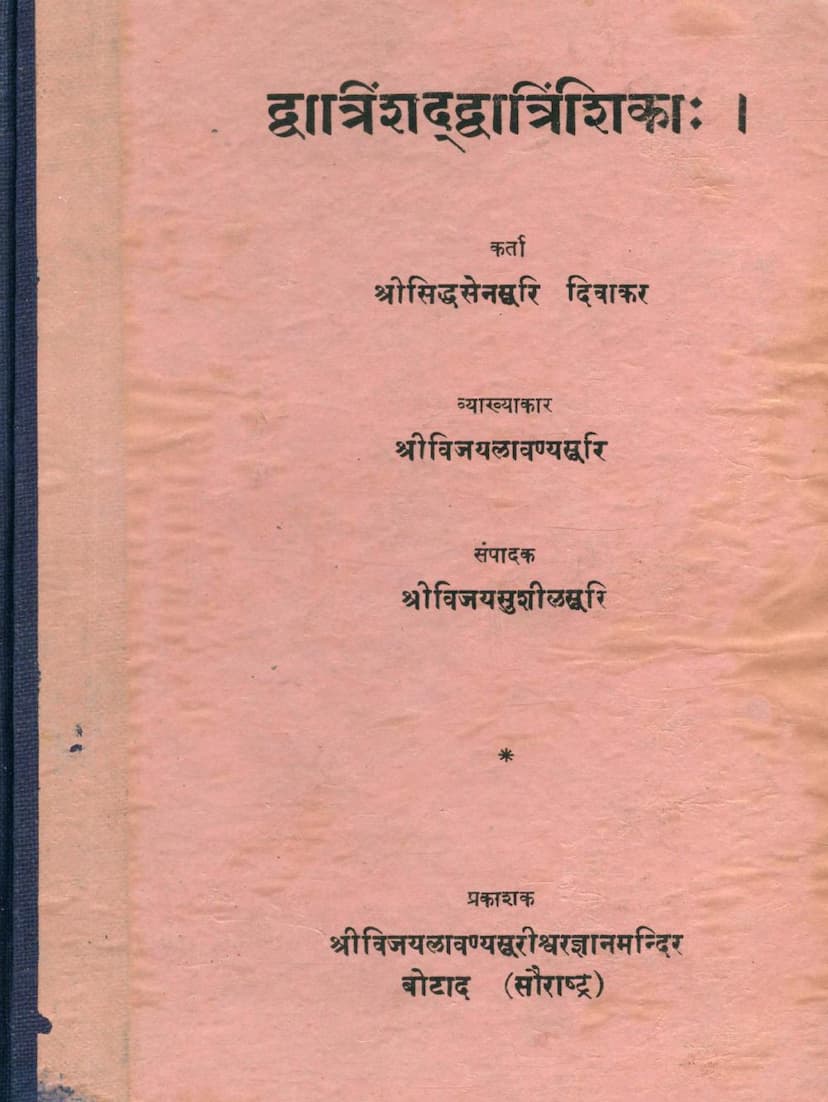Dwatrinshad Dwatrinshika
Added to library: September 1, 2025

Summary
This document is the catalog link and a partial transcription of the Jain text "Dwatrinshad Dwatrinshika" (द्वात्रिंशद् द्वात्रिंशिकाः) by Vijaysushilsuri, published by Vijaylavanyasuri Granthmala. The text itself is attributed to the author Shri Siddhsen Suri Divakar.
Here's a summary of the provided pages, focusing on the content and context of the publication:
Book Details:
- Title: Dwatrinshad Dwatrinshika (द्वात्रिंशद् द्वात्रिंशिकाः), also known as Battisha Battishi (बत्रीश बत्रीशीओ) or Battisha Battishi (बत्तीशा बत्तीशी).
- Original Author: Shri Siddhsen Suri Divakar (श्रीसिद्धसेनसरि दिवाकर)
- Commentator/Annotator: Shri Vijaylavanya Suri (श्रीविजयलावण्यसरि) - who wrote the commentary 'Kiranaoli Vivriti' (किरणावलीविवृति)
- Editor: Shri Vijay Sushil Suri (श्रीविजयसुशीलसूरिः)
- Publisher: Shri Vijaylavanya Suri Gyan Mandir, Botad (Shri Vijaylavanya Suri Knowledge Temple, Botad) (श्रीविजयलावण्यसूरीश्वरज्ञानमन्दिर बोटाद)
- Year of Publication: Nemi Samvat 27 [1977 CE] (नेमि सं० 27 [इ. स. 1977])
- Price: Rs. 30.00 (रू० 30-00)
Content Summary:
The provided pages primarily consist of the foreword (प्रकाशकीय निवेदन), editorial statement (संपादकीय वक्तव्य), introduction (उपोद्घात), and the beginning of the commentary on the first Dwatrinshika.
-
Publication Context (Pages 1-3):
- The publication is presented as a significant endeavor by the Vijaylavanya Suri Gyan Mandir, Botad.
- It highlights that out of the original 32 Dwatrinshikas by Siddhsen Divakar, only 21 are currently available.
- The publication of the commentary 'Kiranaoli Vivriti' on these 21 Dwatrinshikas is met with great joy by the publishers.
-
Editorial and Publisher's Notes (Pages 4-8):
- The publisher expresses gratitude to the late Acharya Shri Vijaylavanya Surishwarji Maharaj for composing the 'Kiranaoli' commentary.
- Special thanks are given to Acharya Shri Siddhsen Diwakar Surishwarji Maharaj for the original Sanskrit work.
- The editor, Shri Vijay Sushil Surishwarji Maharaj, is praised for his work in editing and bringing this volume to publication.
- The text is considered a high-quality work in the field of Darshan Shastra (दर्शनशास्त्र - Philosophy/Logic).
- The original text is in verse (padyam - पद्यमां), showcasing the poetic talent of the original author.
- Challenges in publication are mentioned, including the death of the commentator Shri Vijaylavanya Surishwarji Maharaj, leaving some of his works in a raw state. The editing work for the remaining Dwatrinshikas was undertaken by Shri Ambalal Premchand Shah, under the supervision of Shri Vijay Sushil Surishwarji Maharaj.
- The publishers acknowledge potential errors in printing and express their intention to correct them in future editions if brought to their attention by scholars.
- Dr. Pinaki Dave is thanked for writing a scholarly preface. It's noted that Dr. Dave received a Ph.D. degree for his work on this text.
- The price of Rs. 30.00 is explained as a reflection of the high cost of living and printing.
- The publishers acknowledge the delay in publication due to press limitations and mention that despite careful proofreading, some errors might remain, requesting scholars to inform them.
-
Introduction (Upoḍghāt - Pages 9-18):
- This section provides a detailed biographical and intellectual overview of Acharya Shri Siddhsen Diwakar, highlighting his significant contribution to Jain thought.
- He is considered one of the most important Jain thinkers, and no work on Indian philosophy is considered complete without mentioning him.
- His multifaceted personality is noted as attracting modern scholars, but it's felt that his genius hasn't been properly presented.
- Pundits Sukhlalji and Bechardasji are credited for their work, primarily limited to Siddhsen Diwakar's 'Sanmatitark' (सन्मतितर्क).
- The 'Dwatrinshad Dwatrinshika' is identified as another significant work by Siddhsen Diwakar, described as 'difficult' in its original form, making the commentary 'Kiranaoli' by Shri Vijay Lavanyasuri invaluable.
- The author of the preface (likely Dr. Pinaki Dave) shares that his Ph.D. thesis was on Siddhsen Diwakar's works.
- The text discusses the challenging nature of understanding the Dwatrinshikas and the immense contribution of Acharya Vijay Lavanyasuri.
- The introduction delves into Siddhsen Diwakar's life, drawing from various biographical works like 'Prabhachandra Charit' (प्रभाचक्रित), 'Prabandh Chintamani' (प्रबन्धचिन्तामणि), and 'Prabandh Kosh' (प्रबन्धकोश).
- It touches upon his possible Brahmin birth, his father Devrishi, and mother Devshri.
- His studies in Avant, his initial arrogance, his defeat in debate against Vriddhvadi, and his subsequent initiation into Jainism are mentioned, though details vary across texts.
- His other names like Kumudchandra and Kṣapaṇaka are discussed, along with the controversy surrounding the latter and its attribution to a different Siddhsen.
- The text mentions the miraculous events associated with Siddhsen Diwakar, such as receiving knowledge from a pillar and his connection with King Vikramaditya, and the creation of a Dwatrinshika by him.
- The date of Siddhsen Diwakar is debated, with scholars placing him around the 7th-8th century CE or even earlier, possibly contemporary with Vikramaditya of Ujjain (around 57 BCE).
- The Dwatrinshikas themselves are described, with the original text consisting of 32 Dwatrinshikas, of which 21 are available, containing 32 verses each.
- The commentary 'Kiranaoli' by Vijaylavanyasuri is highlighted for its role in making these complex philosophical and linguistic texts accessible.
- The author of the introduction emphasizes Siddhsen Diwakar's unique contribution to logic and his adherence to Jain principles, even when exploring Sanskrit language and engaging in debate.
-
Beginning of the Commentary (Page 52 onwards):
- The commentary begins with invocations and salutations to Nemi Suri and then to Lord Mahavir (Jin Vardhaman).
- The first Dwatrinshika is then analyzed, starting with the interpretation of the first verse, which describes the characteristics of the Tirthankara. The verses are praised for their poetic and philosophical depth.
In essence, the provided material introduces a significant Jain philosophical and poetic work, emphasizing the effort behind its publication and providing a comprehensive background on its author, Siddhsen Diwakar, and the importance of the commentary by Vijaylavanyasuri.